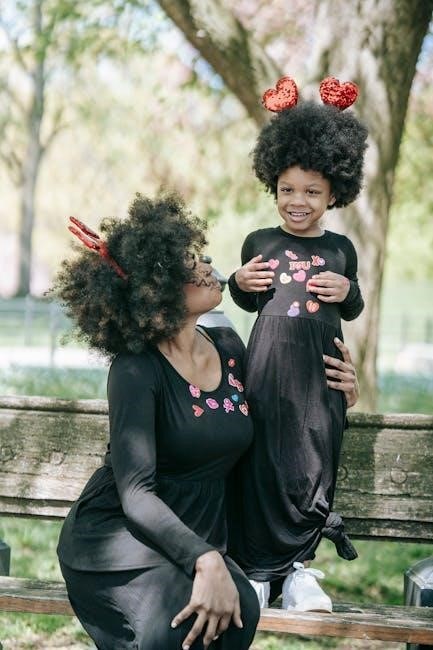Capturing Kids’ Hearts is a transformative educational approach focusing on building strong teacher-student relationships to create a positive classroom environment. It emphasizes mutual respect, clear communication, and consistent expectations to foster academic and emotional growth. Central to the model are the Four Essential Questions for addressing misbehavior, which encourage accountability, reflection, and problem-solving; By engaging students in creating a social contract and using affirmations, educators can build trust and establish a culture of responsibility and respect.
Overview of the Program
Capturing Kids’ Hearts is a relationship-driven program that equips educators to create positive, respectful classroom environments. It focuses on building trust through consistent practices like the Four Essential Questions, social contracts, and affirmations. The program emphasizes emotional intelligence, accountability, and problem-solving, helping students take ownership of their behavior. Professional development and training are key components, ensuring educators are well-prepared to implement these transformative strategies effectively in their classrooms.
Importance of Building Relationships in Education
Building strong relationships in education is foundational for student success. It fosters trust, mutual respect, and emotional well-being, creating a safe environment where students feel valued and supported. Positive relationships improve academic engagement, reduce misbehavior, and enhance social-emotional growth. When educators connect with students on a personal level, it strengthens collaboration and motivation, leading to a more productive and inclusive learning experience that benefits both students and teachers alike.
The Four Essential Questions for Misbehavior
The four essential questions help address misbehavior by encouraging reflection and accountability. They guide students to identify actions, understand expectations, and resolve issues responsibly.
What Are You Doing?
The first question, “What Are You Doing?”, helps students identify and acknowledge their current actions. It encourages self-reflection and honesty, setting the stage for understanding the impact of their behavior; By asking this question calmly and clearly, educators can redirect students’ focus and guide them toward making better choices. This step is foundational in addressing misbehavior and fostering accountability in a respectful and constructive manner.
What Are You Supposed to Be Doing?
The second question, “What Are You Supposed to Be Doing?”, clarifies expectations and classroom responsibilities. It helps students understand the difference between their current actions and what is required of them. This step promotes accountability by highlighting the mismatch between their behavior and the established norms. By asking this question, educators guide students to reflect on their responsibilities and align their actions with classroom expectations. This fosters a clear understanding of what is expected and why.
Are You Doing What You’re Supposed to Be Doing?
This question helps students reflect on whether their actions align with classroom expectations. It encourages them to identify mismatches between their behavior and responsibilities. By asking this, educators guide students to acknowledge when they are not meeting expectations, fostering accountability. This step promotes self-awareness and encourages students to adjust their behavior independently, creating a culture of responsibility and focus. It also reinforces the importance of aligning actions with established norms.
What Are You Going to Do About It?
This question encourages students to take ownership of their actions and think critically about solutions. It prompts them to commit to positive behavior changes, fostering accountability and problem-solving. By involving students in resolving misbehavior, educators empower them to make better choices. This step reinforces responsibility and helps students understand the consequences of their actions, promoting a proactive approach to correcting their behavior and maintaining a positive classroom environment.
The Role of the Social Contract
The social contract is a classroom agreement created collaboratively by students and teachers, outlining mutual expectations for respect and responsibility. It fosters a positive environment.
Creating a Classroom Social Contract
Creating a classroom social contract involves collaboration between students and teachers to establish mutual respect and responsibility. Students participate in drafting rules, ensuring ownership and accountability. The contract outlines expectations for behavior, respect, and communication, fostering a positive environment. Signed by all, it is displayed prominently as a visual reminder of shared commitments. This collaborative process builds trust and encourages students to take responsibility for their actions and relationships.
Student Participation in Contract Development
Student participation is crucial in developing the social contract, ensuring they feel heard and valued. Teachers facilitate discussions, guiding students to reflect on how they want to be treated and how they will treat others. This collaborative approach fosters a sense of ownership and responsibility. By actively contributing, students develop self-awareness and leadership skills, creating a foundation for a respectful and inclusive classroom culture.
Affirmations and Greeting Practices
Affirmations and morning greetings create a positive classroom atmosphere, empowering students and fostering meaningful connections. These practices encourage respect, empathy, and a growth mindset daily.
The Power of Morning Greetings
Morning greetings are a cornerstone of the Capturing Kids’ Hearts approach, fostering a welcoming and inclusive classroom environment. Greeting students at the door with a handshake or kind words sets a positive tone, builds relationships, and encourages engagement. This simple practice helps students feel valued, creating a sense of belonging and respect. It lays the foundation for a supportive and focused learning community, empowering students to thrive academically and emotionally.
Using Affirmations to Reinforce Positive Behavior
Affirmations are powerful tools in Capturing Kids’ Hearts to reinforce positive behavior and build self-esteem. Teachers use specific, genuine praise to acknowledge students’ efforts and achievements, fostering a growth mindset. Consistent affirmations help students feel valued and motivated, encouraging them to take ownership of their actions. This practice strengthens relationships and creates a supportive classroom culture where students thrive emotionally and academically, feeling recognized and appreciated for their contributions.

Consequences for Misbehavior
Capturing Kids’ Hearts outlines a hierarchy of consequences for misbehavior, starting with verbal warnings, conferences, and timeouts, progressing to more severe actions if needed. These consequences aim to teach responsibility and accountability while maintaining a respectful and supportive classroom environment.
Understanding the Hierarchy of Consequences
Capturing Kids’ Hearts introduces a structured hierarchy of consequences to address misbehavior, ensuring consistency and fairness. The approach begins with verbal warnings, followed by conferences, timeouts, and escalating actions like changing seats or losing privileges. More severe misbehavior may result in notes home or involving school administrators. This tiered system helps students understand expectations and take responsibility for their actions while maintaining a supportive and respectful classroom environment.
Appropriate Responses to Disrespect and Misbehavior
Capturing Kids’ Hearts emphasizes responding to disrespect and misbehavior with calmness and consistency. Educators use the Four Essential Questions to guide students in reflecting on their actions and understanding expectations. This approach fosters accountability while maintaining respect. By addressing misbehavior thoughtfully, teachers create a supportive environment that encourages positive behavior and strengthens student-teacher relationships, ensuring a focus on growth rather than punishment.

Implementation and Fidelity
Capturing Kids’ Hearts requires consistent implementation to ensure fidelity. Schools assess program adherence through teacher self-assessments and student focus groups, ensuring alignment with core principles and practices.
Assessing Implementation in Schools
Schools assess the fidelity of Capturing Kids’ Hearts implementation through structured processes. This includes conducting focus groups with principals, teachers, and students to gather insights on program adherence. Teachers also complete annual self-assessments, evaluating their use of key strategies like the Four Essential Questions and social contracts. These evaluations ensure alignment with the program’s core principles, promoting consistency and effectiveness in fostering positive classroom environments and student engagement.
Teacher Self-Assessment and Growth
Teachers engage in annual self-assessments to evaluate their implementation of Capturing Kids’ Hearts strategies. This reflection focuses on consistency in using the Four Essential Questions, social contracts, and affirmations. Educators identify strengths and areas for improvement, fostering professional growth. The process encourages teachers to align their practices with the program’s goals, enhancing their ability to build positive relationships and create a supportive classroom culture.
Professional Development and Training
Capturing Kids’ Hearts offers experiential training, expert coaching, and personalized support for educators. This professional development equips teachers to implement relationship-driven strategies, fostering social-emotional wellbeing and strong connections.
Training Educators for Effective Implementation
Professional development for Capturing Kids’ Hearts involves experiential training, equipping educators with tools to build strong relationships and manage classrooms effectively. Workshops focus on the 4 Essential Questions, social contracts, and affirmations. Teachers learn through interactive sessions, role-playing, and real-world applications, ensuring they can implement the model with fidelity. Coaching and support are provided to help educators refine their skills and sustain positive classroom cultures, fostering social-emotional growth and academic success for all students.
Coaching and Support for Teachers
Coaching and support are integral to helping teachers master the Capturing Kids’ Hearts model; Educators receive personalized guidance to effectively implement the 4 Essential Questions and create a positive classroom environment. Ongoing coaching ensures teachers can address challenges, refine their practices, and sustain relationship-driven education. This support system empowers educators to build strong connections with students, fostering academic and emotional growth while maintaining a culture of respect and accountability in the classroom.
Impact on Social-Emotional Wellbeing
Capturing Kids’ Hearts enhances emotional intelligence and social skills by fostering a positive classroom environment, encouraging responsibility, and promoting respectful relationships among students and educators.
Developing Emotional Intelligence
Capturing Kids’ Hearts helps students recognize, understand, and manage their emotions through structured practices. The Four Essential Questions encourage self-reflection, while affirmations and social contracts foster empathy and self-awareness. By addressing emotional needs, educators create a supportive environment where students develop resilience, build healthier relationships, and improve their ability to navigate social challenges effectively. This emotional growth directly impacts their academic success and overall well-being.
Building a Positive Classroom Environment
Capturing Kids’ Hearts fosters a positive classroom environment by encouraging mutual respect and responsibility. The Social Contract, created with student input, establishes clear expectations for behavior. Morning greetings and affirmations promote a welcoming atmosphere, while the Four Essential Questions guide students in reflecting on their actions. This approach creates a culture of trust, accountability, and emotional safety, enabling students to thrive academically and socially in a supportive and inclusive setting.

Case Studies and Success Stories
Schools implementing Capturing Kids’ Hearts report improved student behavior, increased academic performance, and stronger teacher-student relationships. The model’s effectiveness is evident in real-world success stories nationwide.
Examples of Successful Implementation
Schools nationwide have seen transformative results with Capturing Kids’ Hearts. One district reported a 40% reduction in disciplinary incidents after implementing the Four Essential Questions. Teachers noted improved student engagement and accountability. A middle school in Texas shared how the social contract process fostered a culture of respect, while another elementary school highlighted increased parental involvement due to consistent communication practices. These success stories demonstrate the model’s lasting impact on both students and educators.
Measuring the Effectiveness of the Model
The effectiveness of Capturing Kids’ Hearts is measured through teacher and student feedback, observable behavior changes, and academic performance improvements. Schools track disciplinary incidents, attendance rates, and student engagement. Teachers use self-assessment tools to evaluate implementation fidelity, while focus groups with students and educators provide qualitative insights. The model’s success is evident in reduced misbehavior, improved relationships, and enhanced social-emotional learning, proving its transformative impact on educational environments.
Challenges and Solutions
Educators implementing Capturing Kids’ Hearts may face challenges like consistent implementation and engaging diverse learners. Solutions include ongoing professional development, teacher collaboration, and individualized student support.
Common Challenges Faced by Educators
Educators implementing Capturing Kids’ Hearts often face challenges such as consistent implementation across classrooms, engaging diverse learners, and managing time effectively. Some teachers struggle with balancing relationship-building while maintaining academic rigor. Additionally, ensuring the social contract is understood and followed by all students can be difficult. Teachers may also face resistance from students accustomed to traditional disciplinary methods, requiring patience and creative strategies to foster buy-in.
Strategies for Overcoming Implementation Hurdles
Professional development aligns educators with program principles, fostering a supportive environment and systematic problem-solving. Apply the four questions to encourage accountability, helping students grasp expectations. Involve students in social contracts for ownership. Affirmations build confidence. Consistent implementation minimizes disparities. Seek support and integrate the model into routines for a sustainable culture.
The Capturing Kids’ Hearts model effectively uses four questions to address misbehavior, fostering a positive environment where students and educators thrive through mutual respect and accountability.
Summarizing Key Concepts
Capturing Kids’ Hearts emphasizes building strong relationships through the four essential questions for misbehavior, creating a social contract, and using affirmations. These strategies foster accountability and responsibility, helping students understand expectations and consequences. The model promotes a positive classroom environment where mutual respect and trust are foundational. By focusing on emotional intelligence and social-emotional wellbeing, educators empower students to succeed academically and personally, creating a lasting impact on their lives.
The Future of Relationship-Driven Education
The future of education lies in fostering strong, meaningful relationships between educators and students. Capturing Kids’ Hearts paves the way by emphasizing emotional intelligence, mutual respect, and a supportive classroom culture. As schools adopt this model, educators will continue to prioritize connection and empathy, ensuring students feel valued and empowered to thrive academically and socially. This approach will shape a generation of resilient, compassionate learners ready to succeed in an ever-changing world.